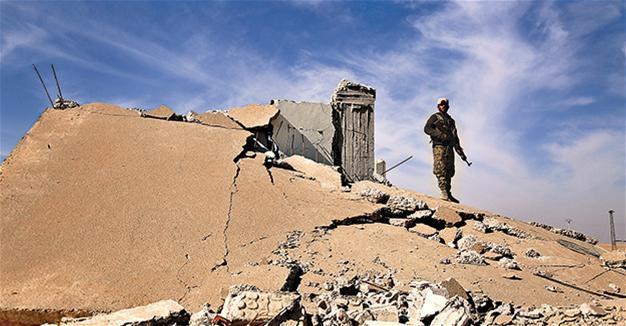US-backed forces push closer to ISIL ‘capital’ Raqqa
AIN ISSA, Syria

REUTERS photo
A U.S.-backed Kurdish-Arab alliance pushed closer to the Islamic State of Iraq and the Levant’s (ISIL) de facto capital of Raqqa in Syria on Nov. 8, a spokesperson said.
Syrian Democratic Forces (SDF), which are composed of Kurdish and Arab forces, have been pushing south from areas near the Turkish border towards Raqqa and alliance spokeswoman Jihan Sheikh Ahmed said Nov. 8 they had moved to within 36 kilometers (22 miles) of the city.
“Two more villages have been taken since yesterday,” she told AFP on Nov. 8, adding that SDF forces had so far advanced 14 kilometers (nine miles) closer to Raqqa from Ain Issa, the main staging point for the operation, that was launched don Nov. 6.
“The fighting continues; morale is good and our fighters are determined that this offensive will succeed,” she said.
SDF commanders said ISIL has been fighting back with its favorite tactic of sending suicide bombers in explosives-packed vehicles against advancing forces.
Many of the attacks have been foiled by coalition air strikes or anti-tank fire, they said. SDF forces have been seen digging trenches and piling sandbags in retaken areas to reinforce their positions.
Like in the battle for Mosul, which is ongoing since Oct. 17, the goal of the Raqqa offensive is to surround and isolate the jihadists inside the city, before eventually mounting a street-to-street assault.
Raqqa had a population of some 240,000 before the start of the Syrian civil war in 2011 and more than 80,000 people have since fled there from other parts of the country.
Raqa and Mosul are the last major cities in Syria and Iraq under the jihadists’ control and their capture would deal a knockout blow to the self-styled “caliphate” ISIL declared in mid-2014.
The U.S.-led coalition that launched operations against ISIL two years ago is providing crucial backing to both offensives, with air strikes and special forces advisers on the ground.
Unlike in Iraq, where the coalition has a state-controlled ally in federal forces, in Syria its ground partner is comprised of local militias, including some rebel groups that have battled Syrian President Bashar al-Assad’s regime.
The domination of the SDF by the Kurdish People’s Protection Units (YPG) has also raised deep concerns in Turkey, which considers the YPG a terrorist group linked to the outlawed Kurdistan Workers’ Party (PKK).
